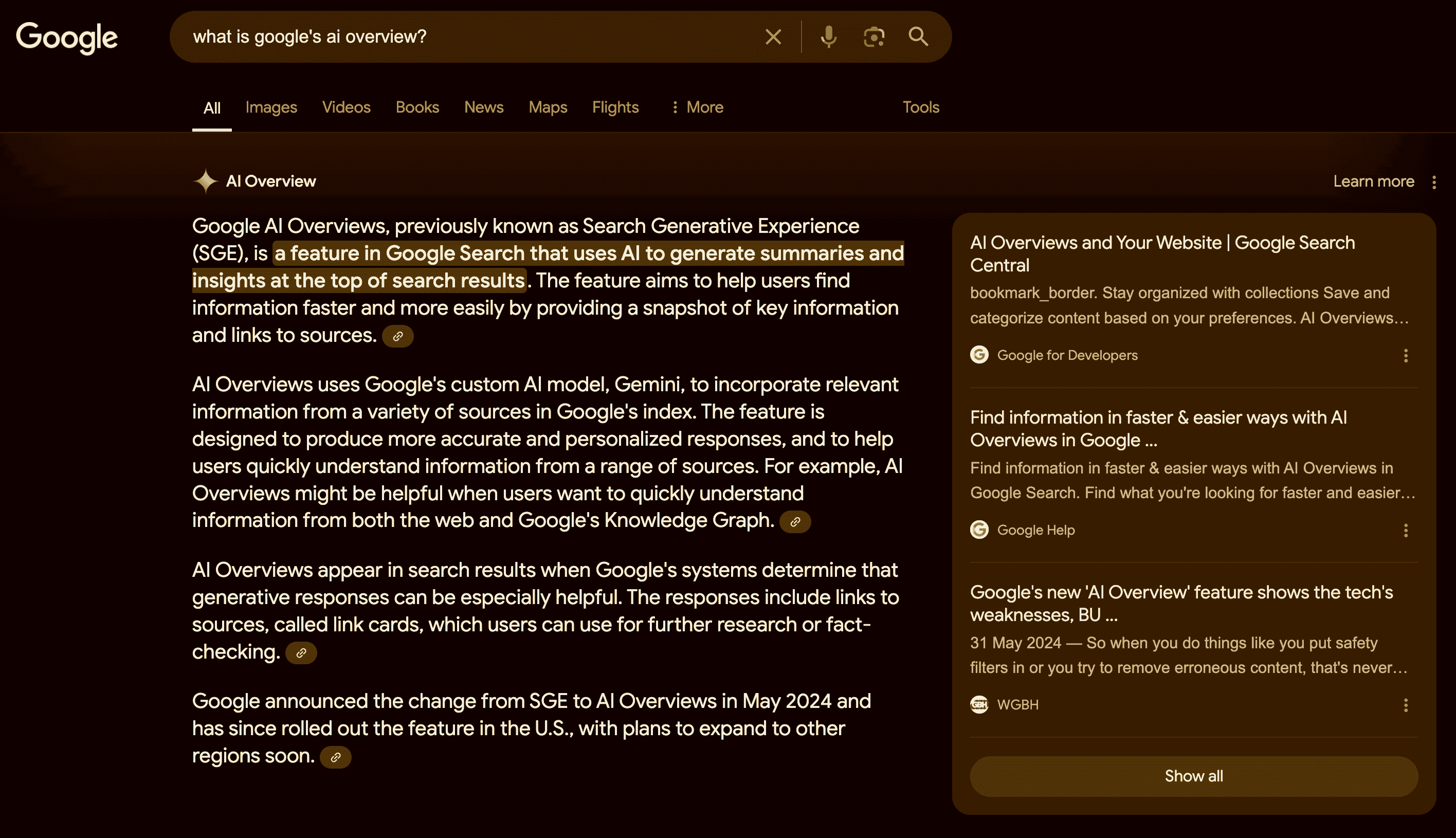10 Mistakes To Avoid When Analyzing Your Website’s Keyword Rankings
Last updated on Saturday, November 4, 2023

Analyzing your website's keyword rankings is crucial to staying competitive and successful in an increasingly online world.
Why? Recent statistics reveal that over 90% of web traffic is directed to the first page of search results, with the first three results capturing the most clicks. By tracking keyword rankings, you can determine which keywords drive organic traffic and optimize your content accordingly.
Another significant benefit of keyword analysis is a better understanding of how your competitors are performing. Researching specific keywords your competitors rank for can help you plan your SEO strategy and outperform them.
However, there are some common mistakes people make when analyzing their keywords. In this blog, we highlight some of these mistakes and why to avoid them.
Are you ready to get a more accurate picture of your site's performance and develop a more effective SEO content strategy? Let’s dive in.
Top 10 Mistakes To Avoid When Analyzing Your Website's Keyword Rankings
Analyzing your website's keyword rankings is crucial for search engine optimization success. But it's easy to make mistakes that can mislead your efforts.
Here are the top 10 mistakes to avoid when analyzing your website's keyword rankings.
#1. Not Considering Long-Tail Keywords
A common mistake when analyzing your website's keyword rankings is ignoring long-tail keywords. These are longer, more relevant keywords that people use when actively searching for what you offer.
For example, instead of targeting the short-tail keyword "gym wear," you can target the long-tail keyword "gym wear for men." This keyword is more specific and tells you more about the searcher's intent.
Also, you can see that “gym wear” has a keyword difficulty of 69 or difficulty of “hard.” That means this specific keyword is quite challenging to rank for.
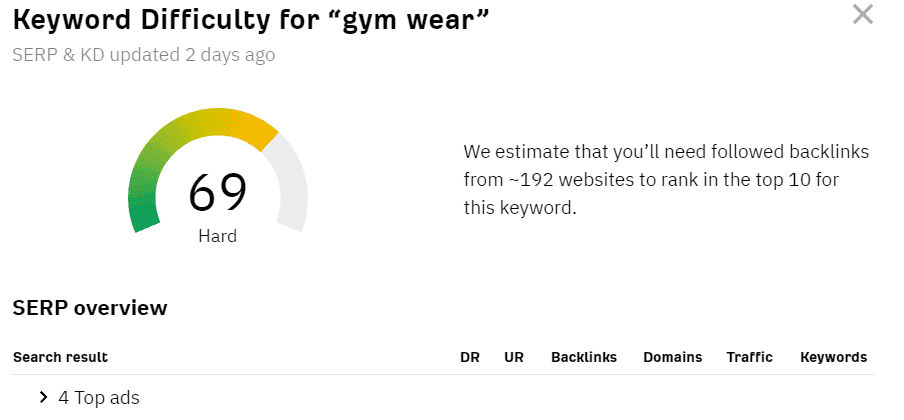
Meanwhile, “gym wear for men” has a keyword difficulty of 30 or a “medium” difficulty. Out of the two keywords, this keyword is easier to rank for.
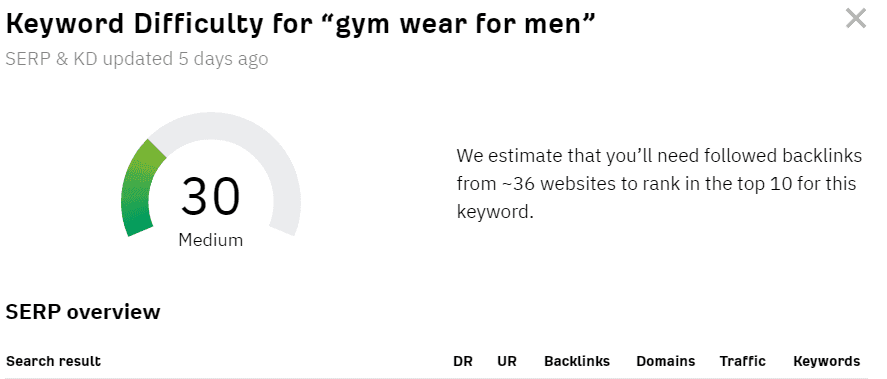
In short, the keyword difficulty for long-tail keywords is less than that for short-tail keywords.
The result? Targeting long-tail keywords makes it easier to score a coveted spot on the first few pages of Google and increase conversion rates.
#2. Ignoring Local SEO Rankings
Local SEO ranking is your website's position in search engines for queries that include a location.
For example, if you search for "salon near me," Google will show you results based on your current location.
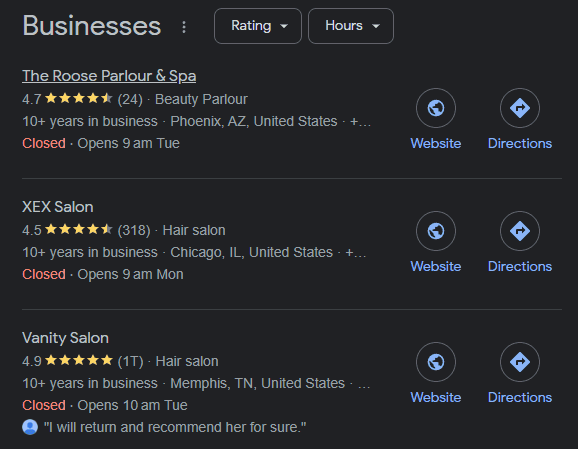
It's important to track local SEO rankings while analyzing your website’s keyword rankings. Why? Because it can help you attract more customers actively searching for what you offer.
For example, if someone searches for "best salon in the US" and the ranking position of your business is higher in the search results, they're more likely to visit your website and book an appointment.
You can use tools like Google Analytics to track your local SEO rankings. Google Analytics can help you track your local SEO rankings by providing insights into your website traffic from local searches.
For example, you can use Google Analytics to track:
- Search volume from local searches
- Target keywords that people are using to find your website
Location of your website visitors
#3. Over-relying on Single Data Points
Don't rely on single data points to analyze your website's keyword rankings.
People often panic and make drastic changes to their SEO strategy when they see a drop in ranking position for a single keyword. We know it’s tempting, but give it some time before making any drastic changes.
Keyword rankings fluctuate due to algorithm updates, competitor activity, and user behavior (which can take weeks to fully roll out).
Plus, one data point may not represent your overall performance. For example, a drop in ranking for an unimportant keyword may not be significant if your rankings for more relevant keywords are stable or increasing.
Hence, track your keyword rankings over a longer period and look for trends to avoid relying on single data points. Waiting a few weeks before making any decisions will help you identify any significant changes in your performance and take corrective action if necessary.
#4. Failing to Account for Personalized Search Results
Personalized search results are tailored to each user based on their search history, location, and other factors. That means two users may see different results for the same search query.
Here’s a look at what one user sees when searching for the keyword “how to rank my website on Google”:
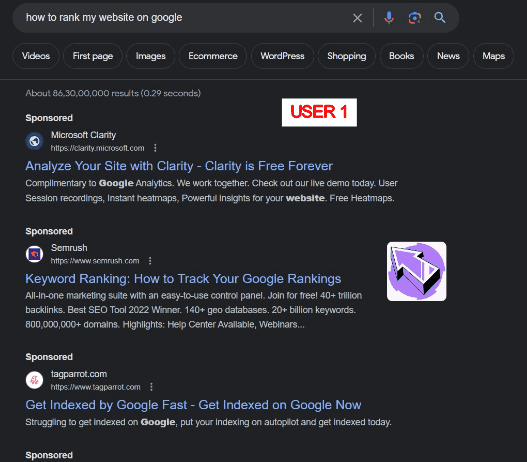
And here’s what the other user sees:
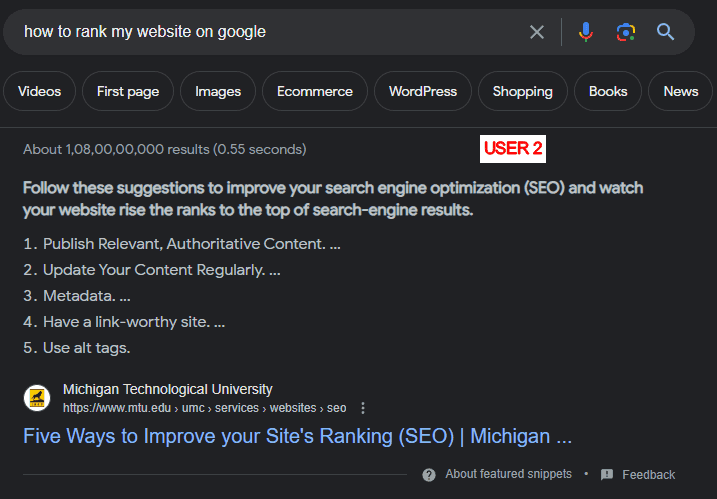
Failing to consider personalized search results can lead to inaccurate conclusions when analyzing your website's keyword rankings. Because without personalized search results, you'll see an average ranking for a particular keyword among all users.
However, this average ranking may not be accurate for your target audience, as it'll include rankings from users who aren't interested in what you offer.
Here are some tips to avoid this mistake:
Use a tool that allows you to see search results for a specific keyword for different users. Google Analytics, Google Search Console, Semrush, and Moz all offer this feature.
Focus on long-tail keywords. Long-tail keywords are more specific and less competitive than short-tail keywords, so they are less likely to be influenced by personalized search results.
#5. Neglecting Mobile vs. Desktop Ranking
Ignoring mobile device rankings can lead to missed opportunities as more and more people use them to search the web. In 2023, over 55% of all web traffic will come from mobile devices.
To ensure your website is visible to potential customers no matter how they search, track your keyword rankings on mobile and desktop.
For example, if you sell running shoes and track your search engine rankings for the keyword "running shoes," you might notice that your website ranks in the top 10 results for desktop devices but only in the top 20 results for mobile.
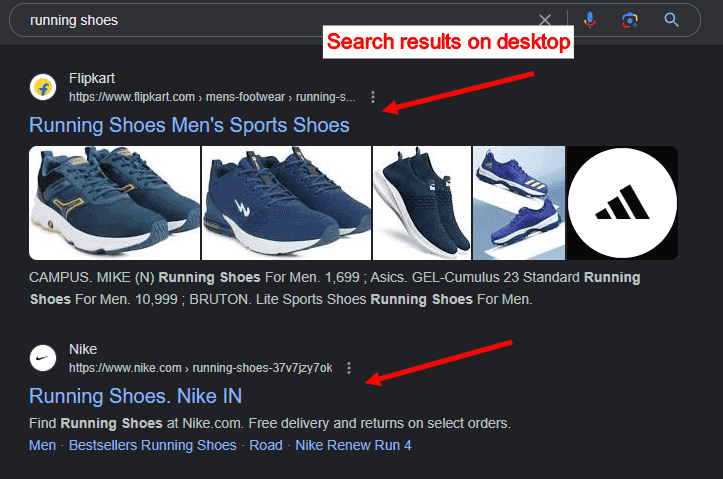
This means you're missing out on a significant amount of traffic from mobile users. To improve your mobile rankings, ensure your site is mobile-friendly and optimized for mobile search.
#6. Not Analyzing SERP Features
Not analyzing SERP features for your website's keyword rankings can cost you valuable traffic.
SERP features appear in search results beyond traditional organic listings, such as code snippets, knowledge graphs, image packs, and local packs.
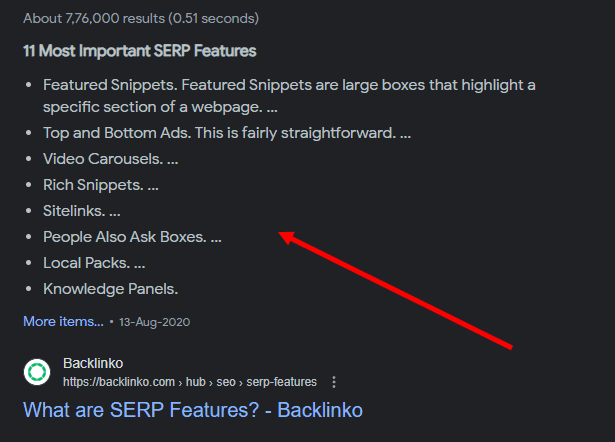
By analyzing SERP features, you can identify opportunities to optimize your content for these features, which can improve your visibility and click-through rate (CTR).
For example, if you're ranking for a keyword with a featured snippet, you can optimize your content to match the featured snippet. This process may involve adding a similar piece of text to your site or making other changes to your content.
Here are some tips for analyzing SERP features:
- Use a keyword research tool to identify the SERP features appearing for your target keywords.
- Analyze the content of the SERP features to see what information Google provides.
Consider how you can optimize your content to match SERP features.
#7. Reacting Too Hastily to Fluctuations
Reacting too quickly to fluctuations is a common mistake when analyzing your website's keyword rankings. Not every fluctuation is significant. A one-day drop is usually just temporary.
However, if search engine rankings consistently drop over time, this could be a problem.
Track your keyword rankings over time using a tool like Google Search Console. If you see a steady decline, you may need to change your website's SEO strategy.
However, avoid reacting too hastily. Investigate the cause of the drop and then develop a plan to address the problem.
#8. Over-emphasizing Vanity Metrics
While analyzing your website's keyword rankings, stop focusing on vanity metrics like rankings alone.
Vanity metrics look good on paper but don't necessarily correlate to business success. For example, a high keyword ranking doesn't mean your website is generating traffic or conversions.
Instead, focus on metrics that matter most to your business, such as traffic, conversions, and revenue. By focusing on these metrics, you can make better SEO decisions and improve your website's performance.
#9. Ignoring Competitor Keyword Movements
Are you tracking your competitors' keyword rankings? If not, you're missing out on a valuable opportunity to improve your SEO strategy.
Through competitor analysis, you can:
- Identify a list of keywords to target
- Stay ahead of trends
- Improve your overall SEO performance
Learn what works and what doesn’t
Let's say you see a competitor ranking for a keyword that you don't target but has high search volume and low competition. You’ve unlocked a golden opportunity to add that keyword to your list and start ranking for it yourself.
By doing so, you can attract more visitors to your website and boost your bottom line.
#10. Neglecting Algorithm Updates
Google and other search engines regularly update their algorithms. Thus, staying up to date with algorithm updates is important for analyzing your website’s keyword rankings. That way, you can adjust your SEO strategy accordingly if you want to keep your current position.
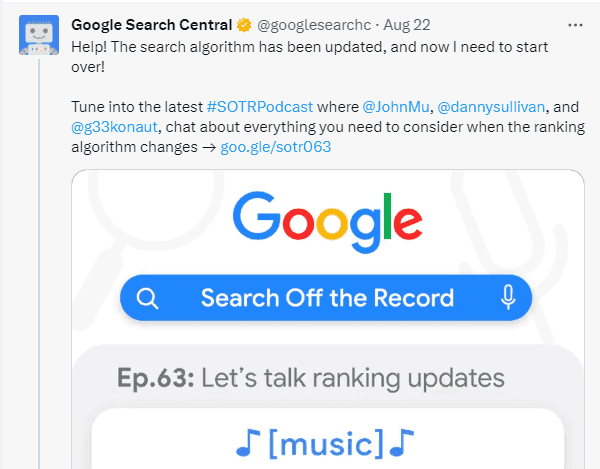
Source: X
On August 22, 2023, Google made a major change to its search algorithm. It announced an update, called a broad core update, designed to improve the overall quality of Google's search results.
Some websites may rank higher or lower after the change, depending on how good their content and user experience are.
If you own a website that sells products, it's important to make sure your product reviews are high quality. You can do this by encouraging customer feedback, responding to reviews, and removing any false or misleading reviews.
Analyze algorithm updates and make changes to your SEO strategy if necessary. However, be patient, as it can take some time for your site to recover after an algorithm update.
In other words, your keyword performance might suffer. But it could bounce back in a few weeks and outperform again in organic search.
Final Thoughts
Avoiding mistakes while analyzing your website's keyword rankings is essential for SEO success.
It’s very likely that half of SEO professionals make at least one of the common keyword ranking mistakes discussed in this blog post. Every mistake can cost you valuable traffic, leads, and sales.
If you are one of the many SEO marketers who are making keyword ranking mistakes, don't worry. It's not too late to turn things around.
Bookmark this guide for future reference anytime you're tempted to make changes to your content or SEO strategy based on keyword ranking fluctuations.
Patience is the key to achieving your search engine optimization goals and boosting your average position in search rankings. Here’s to your success!

Article by:
Catalina Grigoriev
SEO and Content Marketing at Planable
Catalina Grigoriev is a incurable optimist with a bubbly personality. That’s what my colleagues say. Secret mission: cat lover disguised as a dog person. Ex law student who switched into the digital marketing lane. Currently delving into the depths of SEO and content marketing at Planable.
